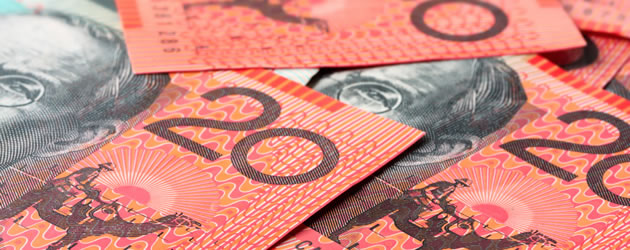The Euro to Australian Dollar (EUR/AUD) exchange rate dived by around -1.40% on Thursday morning.
The shared currency softened versus the majority of its most traded currency competitors on Thursday thanks to a lack of influential domestic data to curb the bearish run. The general declination is as a result of damp investor confidence as geopolitics in Greece weigh on trader focus. With Greece’s credit rating downgraded by Standard & Poor’s (S&P) on the basis that the debt-riddled nation will not be able to juggle all of its financial commitments, demand for the common currency cooled.
The Australian Dollar, conversely, advanced versus nearly all of its major peers in response to surprisingly positive labour market data. Rising gold prices, thanks to demand for safe-haven assets, also aided the ‘Aussie’ (AUD) appreciation.
The Euro to Australian Dollar (EUR/AUD) exchange rate is currently trending in the region of 1.3713.
Euro (EUR) Exchange Rate Cools as S&P Downgrade Credit Rating
With a sparse economic docket in terms of influential European data, the common currency continued its bearish run on Thursday. Domestic data has had very minimal impact over the past few months, with geopolitics the focal point of Euro trade. Speculation that Athens will not be able to produce acceptable reforms by the April 24th deadline and the prospect of a forced Greek exit from the Eurozone is weighing heavily on investor confidence.
Compounding the lack of risk-appetite was news from S&P that Greece’s credit rating has been downgraded. ‘Greece increasingly depends on favourable business, financial and economic conditions to meet its financial commitments,’ S&P said in its report. The top ratings agency cut Greece’s rating to ‘CCC+’ from ‘B-‘.
The agency warned that ‘without deep economic reform or further relief, we expect Greece’s debt and other financial commitments will be unsustainable.’
The Euro to Australian Dollar (EUR/AUD) exchange rate dropped to a low today of 1.3695.
Australian Dollar (AUD) Exchange Rate Rallies on Positive Data
Having declined significantly of late, thanks to a rising US Dollar and poor data out of China, the ‘Aussie’ rallied versus the majority of its most traded currency competitors on Thursday. This can be attributed to surprisingly positive labour market data.
Employment Change saw 37,700 newly employed in March, bettering the median market forecast gain of 15,000. March’s Unemployment Rate was forecast to rise from 6.2% to 6.3%, but the actual result showed a positive declination to 6.1%. In addition, April’s Consumer Inflation Expectation came in at 3.4%, bettering the previous figure of 3.2%.
‘Most of the improvement looks like it actually happened in February and not March,’ said Ben Jarman, a senior economist at JPMorgan Chase & Co. in Sydney. ‘We have had these decent size upward revisions in employment in February, which the ABS say is to do with technical changes in seasonal adjustment, you do have question marks over how much influence that had.’
Also aiding the ‘Aussie’ appreciation are rising gold prices as traders seek safe-haven assets in the face of mounting problems in Greece. ‘Looking at the global financial picture, this is not the time to cancel your insurance and may be a good time to buy some protection, if you do not have some gold as a diversifier,’ Peter Hug, global trading director at Kitco Metals, said in a note to investors.
Euro to Australian Dollar (EUR/AUD) Exchange Rate Forecast to Hold Losses
Given that the situation in Greece is no nearer to resolution and with gold prices rising, the Euro to Australian Dollar (EUR/AUD) exchange rate is likely to hold losses for the remainder of Thursday’s European session.
Friday could see heightened EUR/AUD volatility with Eurozone inflation data due for publication. However, considering that European economic data has had minimal impact with Greece dominating trader focus, the likelihood is that trade will continue to be centred on geopolitics.
The Euro to Australian Dollar (EUR/AUD) exchange rate advanced to a high of 1.3936 today.



